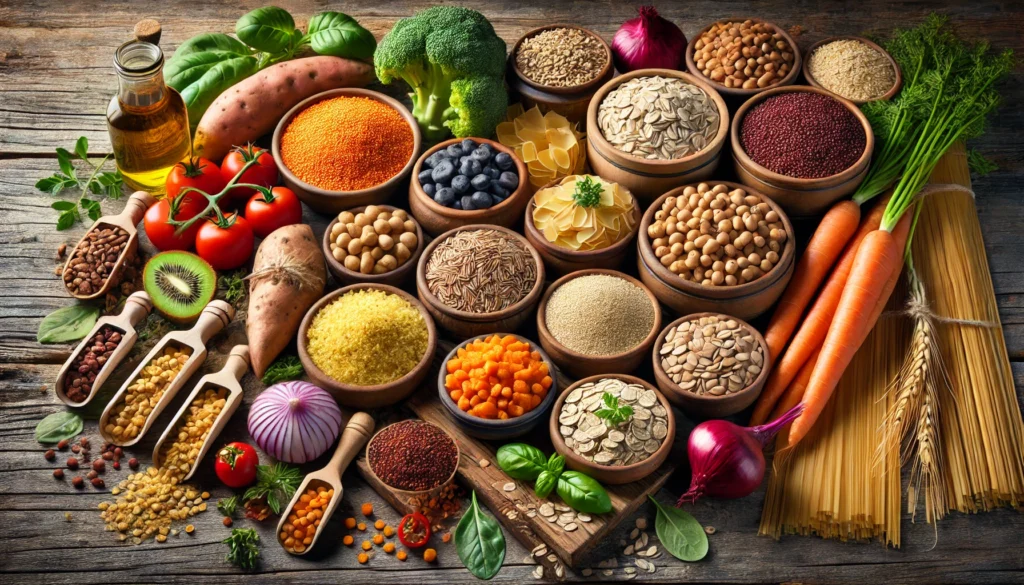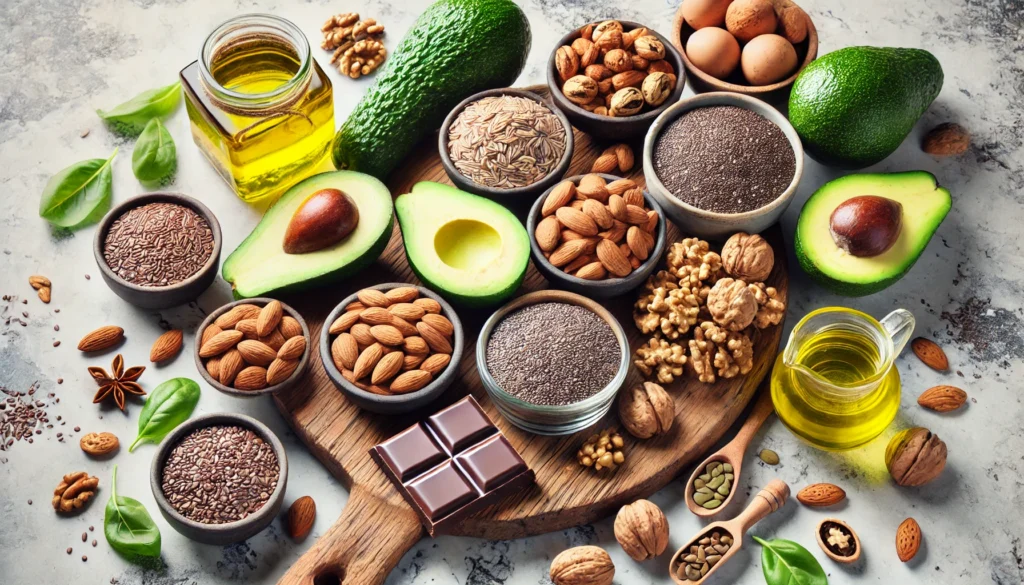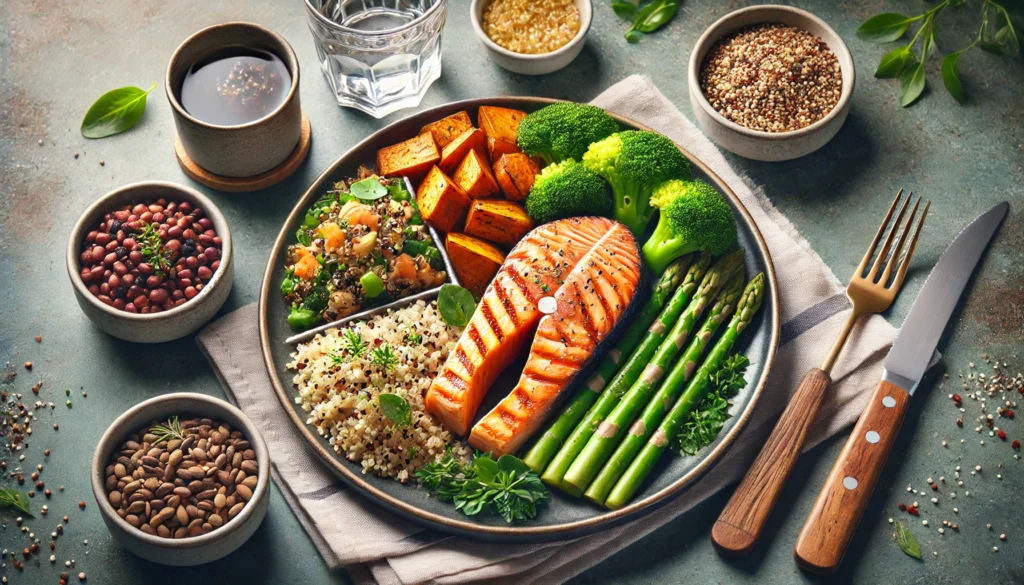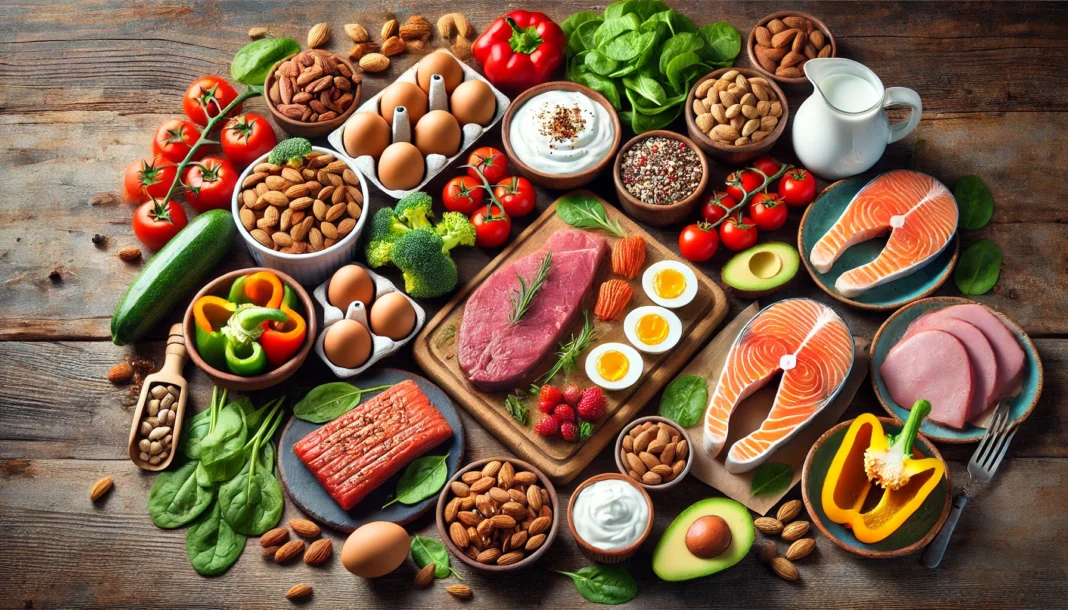Understanding Bulking and Its Importance
Bulking is a crucial phase for athletes and fitness enthusiasts looking to increase muscle mass and strength. This process involves consuming more calories than the body burns, ensuring a surplus that aids muscle growth. However, it is not simply about eating more; it requires a strategic approach that incorporates nutrient-dense foods essential for muscle recovery and athletic performance. The best bulking diet consists of a balance of macronutrients, including proteins, healthy fats, and complex carbohydrates, to fuel workouts and optimize muscle regeneration. Without the right nutritional foundation, bulking efforts can lead to excessive fat gain rather than lean muscle development.
You may also like: Best Recovery Foods: What to Eat for Muscle Recovery and Repair After Intense Training
Athletes often struggle with determining what to eat to bulk effectively. It is not just about high-calorie intake but selecting quality foods that support strength and endurance while minimizing unnecessary fat accumulation. Consuming good bulking foods ensures that muscles receive the necessary amino acids, vitamins, and minerals required for growth and recovery. Additionally, choosing the right diet can significantly impact energy levels, training capacity, and overall athletic performance.
Protein-Rich Foods for Optimal Muscle Growth
Protein is the building block of muscle tissue, making it a fundamental component of any bulking regimen. The best foods for bulking include high-quality protein sources that provide essential amino acids necessary for muscle repair and growth. Lean meats such as chicken breast, turkey, and lean cuts of beef are staples in bulking diets due to their high protein content and minimal fat. Poultry and beef also supply essential micronutrients like iron and zinc, which contribute to muscle function and recovery.
Fish, particularly fatty fish like salmon, tuna, and mackerel, offer a dual benefit of protein and omega-3 fatty acids, which reduce inflammation and enhance muscle repair. Plant-based protein options such as lentils, chickpeas, and tofu provide valuable protein while being rich in fiber, promoting better digestion and nutrient absorption. Incorporating dairy products like Greek yogurt and cottage cheese into meals for bulking muscle adds slow-digesting casein protein, which helps sustain muscle protein synthesis throughout the day and night.
Eggs are another powerhouse protein source ideal for bulking. They contain all essential amino acids in optimal ratios, making them one of the most efficient proteins for muscle growth. Moreover, their healthy fat content and presence of choline support cognitive function and overall metabolic health. Ensuring a diverse range of protein sources allows athletes to maintain a balanced and effective bulking diet that supports sustained muscle development.

Carbohydrates: The Key to Energy and Performance
While protein is essential for muscle repair, carbohydrates play a pivotal role in fueling workouts and replenishing glycogen stores. The best bulking meals incorporate complex carbohydrates that provide sustained energy, preventing muscle breakdown during intense training sessions. Whole grains such as brown rice, quinoa, oats, and whole wheat pasta are excellent carbohydrate sources that deliver essential vitamins and minerals while offering a steady release of energy.
Fruits and vegetables should also be a fundamental part of any bulking foods list. Bananas, berries, and oranges provide quick-digesting carbohydrates that can be consumed pre- or post-workout for rapid energy replenishment. Starchy vegetables like sweet potatoes, butternut squash, and carrots are excellent choices due to their fiber content and slow-digesting nature, ensuring stable blood sugar levels and prolonged energy release.
Legumes such as beans, lentils, and peas offer a unique combination of carbohydrates and protein, making them valuable additions to any bulking diet. They provide long-lasting energy and promote muscle recovery, making them particularly beneficial for endurance athletes and strength trainers. Properly timing carbohydrate intake around workouts ensures that muscles are fueled optimally, enhancing both performance and recovery.
Healthy Fats for Hormonal Balance and Recovery
Fats play a vital role in muscle growth and recovery, particularly in supporting hormonal health and reducing inflammation. Healthy bulking foods should include sources of monounsaturated and polyunsaturated fats that contribute to optimal muscle function. Nuts and seeds, including almonds, walnuts, flaxseeds, and chia seeds, are rich in essential fatty acids and protein, making them ideal for snacking or adding to meals.
Avocados are another nutrient-dense option that provides healthy fats along with vitamins such as potassium and vitamin E, which aid in muscle contraction and recovery. Olive oil and coconut oil are excellent additions to cooking, offering healthy fats that promote heart health while supporting energy metabolism. Fatty fish, including salmon and sardines, remain one of the best sources of omega-3 fatty acids, which play a crucial role in reducing exercise-induced inflammation and enhancing muscle repair.
Balancing fat intake with carbohydrates and protein ensures that athletes achieve a well-rounded diet that supports long-term muscle growth without excessive fat gain. Including healthy fat sources in meals for bulking muscle contributes to sustained energy levels and improved recovery times.
Hydration and Nutrient Timing for Maximum Gains
Proper hydration is often overlooked in bulking diets but plays a crucial role in muscle function and recovery. Water is essential for nutrient transport, muscle contractions, and temperature regulation. Athletes should aim to drink adequate water throughout the day, particularly before, during, and after workouts, to maintain optimal performance levels.
Nutrient timing is another critical aspect of a successful bulking plan. Consuming protein and carbohydrates immediately post-workout enhances muscle recovery by replenishing glycogen stores and jumpstarting protein synthesis. Pre-workout meals should focus on easily digestible carbohydrates and moderate protein to provide sustained energy without causing digestive discomfort.
Strategically spacing meals throughout the day prevents excessive fat storage while ensuring a steady supply of nutrients for muscle growth. Snacking on nutrient-dense options such as nuts, yogurt, and protein shakes helps meet calorie requirements without resorting to processed or empty-calorie foods. Understanding when and how to consume these essential nutrients can make a significant difference in achieving optimal bulking results.

Frequently Asked Questions (FAQ) on Bulking and Athletic Recovery
What are the best foods to eat while bulking for lean muscle gains?
When considering what to eat while bulking, it is essential to prioritize nutrient-dense, whole foods that support muscle growth and minimize fat accumulation. The best bulking meals should consist of lean proteins like chicken breast, turkey, and fish, paired with complex carbohydrates such as quinoa, oats, and sweet potatoes. Additionally, incorporating healthy bulking foods such as nuts, avocados, and olive oil ensures adequate fat intake for hormonal balance and recovery. Dairy products like Greek yogurt and cottage cheese also play a crucial role by providing casein protein, which aids muscle repair over extended periods. Ultimately, a well-balanced approach that combines macronutrients effectively will optimize muscle growth while keeping body fat in check.
How does the best bulking diet differ from a standard high-calorie diet?
A high-calorie diet does not necessarily mean an effective bulking strategy, as it may lead to excessive fat gain without proportional muscle development. The best bulking diet is structured around quality foods that supply sustained energy and essential nutrients rather than empty calories from processed or sugary foods. Bulking foods lists often focus on high-protein sources, complex carbohydrates, and healthy fats to enhance recovery and performance. Moreover, nutrient timing plays a significant role in ensuring that muscles receive the necessary fuel before and after workouts. Unlike a generic high-calorie diet, a well-planned bulking approach emphasizes efficiency in macronutrient distribution and meal composition.
What role do micronutrients play in muscle growth during a bulking phase?
While macronutrients like proteins and carbohydrates are fundamental, micronutrients are equally important in optimizing performance and muscle recovery. Foods to eat when bulking should include a variety of vitamins and minerals, such as vitamin D for bone strength, magnesium for muscle relaxation, and zinc for protein synthesis. Leafy greens, berries, and seeds provide antioxidants that reduce inflammation, aiding in faster recovery. Including a diverse range of whole foods ensures that nutrient deficiencies do not hinder progress, supporting optimal hormonal function and energy production. Without adequate micronutrients, even the best bulking meals may fail to deliver maximum results.
How do psychological factors influence bulking success?
The mental aspect of bulking is often overlooked but plays a crucial role in sustaining long-term progress. The diets people do when bulking require discipline and consistency, which can be mentally challenging for individuals unused to high-calorie intake. Developing a positive relationship with food and understanding the necessity of strategic weight gain prevents unnecessary stress or guilt. Additionally, setting clear performance-based goals rather than focusing solely on aesthetics can keep motivation high. Visualization techniques, accountability partners, and structured meal plans can all contribute to maintaining adherence to a bulking regimen without feeling overwhelmed.
What are the best foods for bulking that also support gut health?
Digestive health is crucial when increasing caloric intake, as consuming large quantities of food can sometimes lead to bloating or discomfort. Good bulking foods that promote digestion include fermented products like kefir, kimchi, and sauerkraut, which contain probiotics that improve gut flora. High-fiber foods such as legumes, whole grains, and vegetables also aid in digestion while keeping blood sugar levels stable. Bone broth, rich in collagen and amino acids, can enhance gut lining integrity, reducing inflammation from increased food intake. Ensuring proper hydration and consuming fiber-rich foods makes the transition into a high-calorie diet smoother and more sustainable.
How can athletes avoid excessive fat gain while bulking?
Strategic calorie management and exercise intensity determine whether bulking leads to excessive fat gain. The best foods to eat when bulking should provide ample protein and complex carbohydrates while limiting excessive processed foods and sugars. Strength training remains essential, with progressive overload ensuring that additional calories contribute to muscle development rather than fat accumulation. Adjusting macronutrient ratios based on individual metabolic responses can further refine the process, allowing lean muscle growth without unwanted weight gain. Finally, incorporating cardiovascular activity in moderation helps maintain insulin sensitivity and supports overall body composition.
How do different body types affect bulking strategies?
Ectomorphs, mesomorphs, and endomorphs require tailored approaches when determining what to eat to bulk effectively. Ectomorphs, who naturally have fast metabolisms, benefit from higher carbohydrate intake and more frequent meals to sustain energy. Mesomorphs, with moderate metabolisms and a naturally athletic build, find balanced macronutrient distribution effective in promoting muscle growth. Endomorphs, who tend to store fat more easily, should focus on protein-rich meals for bulking muscle and slightly lower carbohydrate intake while prioritizing lean sources of fat. Understanding one’s body type allows for a more customized and successful bulking strategy.
What are some common mistakes people make when choosing foods to eat when bulking?
One of the most common errors is consuming too many processed and high-sugar foods under the assumption that calorie surplus alone drives muscle growth. Another mistake is neglecting micronutrient intake, which can slow recovery and decrease overall training efficiency. Failing to track portion sizes and meal timing can also lead to excessive fat accumulation rather than lean muscle gains. Additionally, over-relying on supplements instead of whole foods may result in nutrient imbalances. The best bulking diet focuses on whole, nutrient-dense meals that support sustainable muscle development while preventing unnecessary fat gain.
How can meal timing impact performance and recovery during bulking?
When structuring meals for bulking muscle, proper nutrient timing is essential to maximize performance and recovery. Pre-workout meals should focus on fast-digesting carbohydrates and moderate protein intake to provide sufficient energy without causing digestive distress. Post-workout meals should contain both protein and carbohydrates to replenish glycogen stores and facilitate muscle repair. Eating smaller, nutrient-dense meals throughout the day ensures consistent energy levels while minimizing fat storage. Additionally, consuming a slow-digesting protein source, such as casein, before bed can support overnight muscle repair and prevent catabolism.
What long-term benefits can be expected from a well-structured bulking diet?
Beyond immediate muscle gains, following a well-structured bulking diet can enhance metabolic efficiency, improve strength levels, and contribute to better overall health. Building muscle increases basal metabolic rate, making it easier to maintain a lean physique in the long run. A focus on whole foods and proper nutrition also supports joint health, immune function, and mental well-being. Additionally, the discipline developed from a structured bulking diet can carry over into other areas of life, reinforcing habits that support long-term fitness and wellness. Ultimately, a successful bulking phase lays the foundation for sustained athletic performance and overall vitality.

Conclusion: Building a Sustainable Bulking Diet
Creating an effective bulking diet requires more than just increasing caloric intake; it demands a strategic approach that incorporates nutrient-dense, performance-enhancing foods. The best bulking diet prioritizes lean proteins, complex carbohydrates, and healthy fats to support muscle growth while minimizing excess fat gain. By focusing on quality food sources, athletes can optimize their performance, recovery, and overall health.
Knowing what to eat while bulking ensures that every meal contributes to muscle development and athletic recovery. The right combination of foods to eat when bulking provides the energy needed for intense training sessions while supporting muscle repair and reducing inflammation. With careful planning and consistency, a well-structured bulking diet can lead to sustainable muscle gains and enhanced athletic performance.
Further Reading:
26 Foods to Eat to Gain Muscle
30 muscle-building foods to fuel your goals
The information contained in this article is provided for general informational purposes only and is not intended to serve as medical, legal, or professional advice. While NewsHealthWatch strives to present accurate, up-to-date, and reliable content, no warranty or guarantee, expressed or implied, is made regarding the completeness, accuracy, or adequacy of the information provided. Readers are strongly advised to seek the guidance of a qualified healthcare provider or other relevant professionals before acting on any information contained in this article. NewsHealthWatch, its authors, editors, and contributors expressly disclaim any liability for any damages, losses, or consequences arising directly or indirectly from the use, interpretation, or reliance on any information presented herein. The views and opinions expressed in this article are those of the author(s) and do not necessarily reflect the official policies or positions of NewsHealthWatch.

